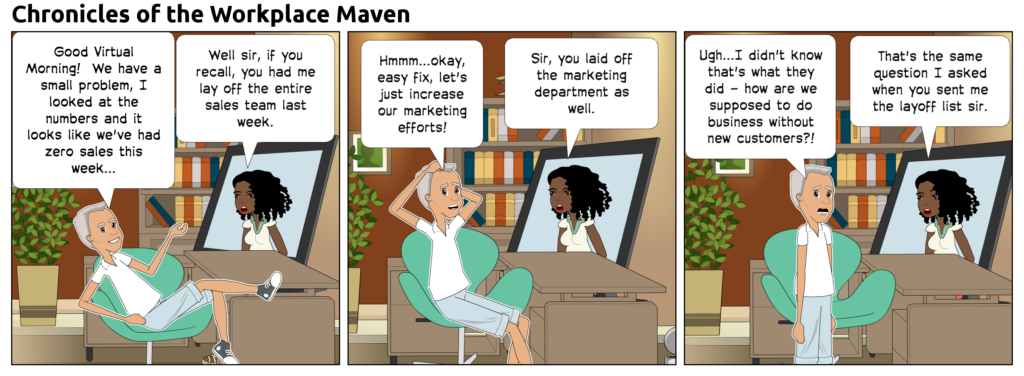The real test of leadership is during times of crisis and adversity. While the COVID-19 pandemic is a crisis like most of us have never seen in our lifetime, this also means that it’s an opportunity for organizations and leaders to rise to the occasion like they never have before. How you treat your employees during this crisis will be the truth serum to what your culture and brand really is as far as your customers, current employees and future employees are concerned. Here are 4 things to consider as you navigate through the workplace challenges caused by this crisis.
1. Proceed with Caution When Considering Slashing Salaries and Jobs. There’s a thin line between reducing your headcount as a reflex and laying off as a necessary measure for the survival of your business. There have been many hero stories of Company CEOs and executive teams taking salary cuts or foregoing salaries, all for the sake of continuing to employ their workforce. In the alternative, you also hear of companies that reactively began laying off employees and slashing salaries before there was any real impact to the business without regard to what it would mean for their employees. We all understand that business leaders and owners will need to make responsible decisions to keep their companies afloat, but those who manage the economic effects of this crisis in a compassionate, employee-centric way will create more value for their organizations in the long-run and will come out of this pandemic stronger than ever before.
2. Consider Alternative Cost Savings Measures. While many businesses are deciding whether to access the variety of forgivable and unforgivable loan programs available, the need to cut costs will be inevitable. When contemplating how to reduce your costs, be creative. Layoffs aren’t the only answer but is often the go-to measure. Consider all your options, including engaging your employees in the process by allowing them to provide feedback on how savings can be achieved during these difficult times. Possible alternatives can be, reducing the work schedule from, 5 days to 4 days; suspending 401k contributions; offering voluntary retirement or sabbaticals; or even if salary reductions are in the mix, applying reductions by tiers so that the most vulnerable group of workers are impacted as least as possible. Taking the extra time to thoughtfully apply cost-cutting measures will demonstrate your good faith effort to avoid negatively impacting your employees as much as is feasible and help you maintain the loyalty and commitment you’ll need when you turn your efforts to getting back to some semblance of business as usual.
3. Overcommunicate – Communicate! This can’t be said enough. During these times of personal and professional uncertainty, it’s vital to engage in a frequent and honest dialogue with your employees whether they are working or laid off. Be transparent about the financial health of your organization and what goals you will be prioritizing. Share why you are making the business decisions that you are making so that you avoid employees coming up with their own scenarios leading them to second-guess the intention of every decision that you make. Keeping your employees in the loop will make it easier for them to understand if and when it will be necessary to make more difficult decisions down the road.
4. Don’t Forget Empathy & Compassion – In addition to communicating the realities of current dire circumstances related to health, safety and business, make your employees’ well-being a focus as well. Recognize that your employees are people too; people with families and lives outside of work that are being deeply impacted by this crisis. Build a virtual community that demonstrates their leaders are there for them and encourage all employees to be there for each other. But even beyond words, publicize any existing Company sponsored or partner offered employee resources such as Employee Assistance Programs (EAP) that often offer mental health hotlines and financial counseling. Also be helpful in making your employees aware of Federal and local government support options and even going so far as having someone help them complete applications. Not only is providing this level of compassion and support the right thing to do; it will also reap nothing but positive sentiments from your workforce that will repay you in dividends when the crisis is over at the very time when everyone’s best effort will be most needed.
When this is all over, in order to recover from this pandemic, don’t forget that your businesses will need fully committed and engaged employees to rise to the top. And as Maya Angelo reminds us, “People will forget what you said, people will forget what you did, but people will never forget how you made them feel”.
The HR & Beyond team is here to provide you best-practice guidance and support. Find out more at www.hrandbeyond.com or email us at info@hrandbeyond.com.

